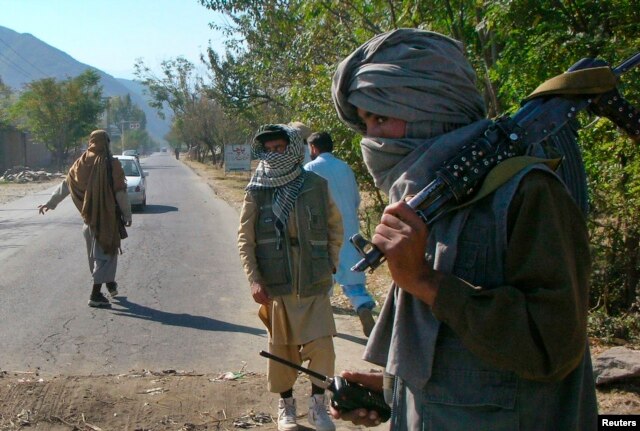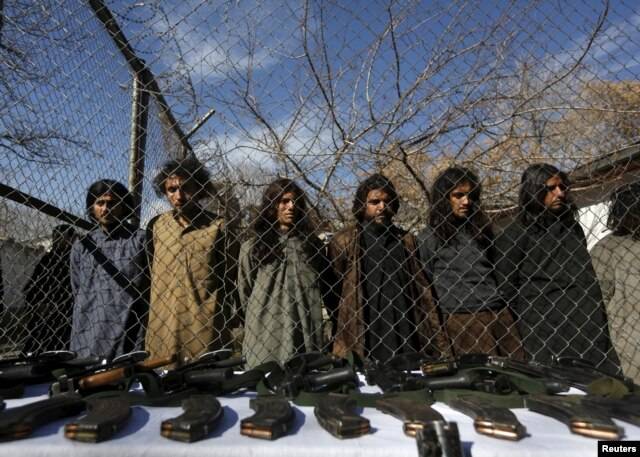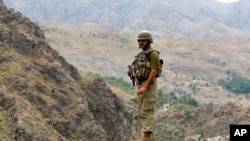Pakistan is hesitant to take action against the Afghan Taliban on its soil because of concerns the group will redirect its violence against Pakistan and Afghan intelligence will support it, a senior Pakistani official said. “We have to think twice before taking action. Anybody we take action against is immediately supported from the other side,” the official told VOA on the condition of anonymity. Afghan President Ashraf Ghani recently demanded that Pakistan either take military action against Taliban commanders on its soil or arrest them and hand them over to Kabul. Pakistan has often complained that when it launched military operations in Swat and South Waziristan in 2009, militants belonging to Pakistani Taliban took shelter in Afghanistan and started using it as a base, with the help of Afghan intelligence, to carry out operations against Pakistan.
Masked Pakistani pro-Taliban militants who are supporters of Maulana Fazlullah, a hardline cleric, stand at a check post in Charbagh, a Taliban stronghold, near Mingora, the main town of Pakistan's Swat valley
As recently as the start of the current operation in North Waziristan in 2014, the Pakistani official said, the Afghan government issued refugee cards to militants who escaped to the other side. Senior journalist and regional expert Rahimullah Yousufzai said the leadership of several Pakistani Taliban groups, including Mullah Fazlullah, the head of Tehreek e Taliban Pakistan, was hiding in Afghanistan. He added that one of the militant leaders, Omar Khalid Khorasani, whose group Jamaat-ul-Ahrar claimed responsibility for an Easter bombing in Lahore in March that killed more than 70 people, was supposed to be getting support from the Afghan intelligence agencies. Afghanistan’s ambassador to Pakistan, Hazrat Omar Zakhilwal, however, rejected the assessment of the Pakistani official. “It’s easy to avoid responsibility and blame someone else for it,” he said, adding that militants like Fazlullah and Khorasani were part of the Pakistani Taliban, who were an “outcome of policies that are still the status quo.”
Enabling the Taliban
Pakistan, he said, had created an environment that enabled the presence of both the Afghan Taliban and the Pakistani Taliban. In addition, he said, Pakistan scuttled opportunities presented by Afghanistan for mutual cooperation in order to change this situation. “Didn’t the Afghan intelligence help with the capture of the Army Public School in Peshawar attackers?” he asked, mentioning a devastating attack in December of 2014 in which more than 130 school children were killed. In return, he said, Pakistan did not take any steps against the Haqqani Network, an Afghan Taliban group that officials at NATO’s Resolute Support mission in Afghanistan have described as one of the “most lethal” groups in Afghanistan.
Pakistani Taliban fighters, who were arrested by Afghan border police, stand during a presentation of seized weapons and equipment to the media in Kabul, Afghanistan
Afghanistan and the United States allege the network has ties to Pakistan’s intelligence agencies and its leadership operates out of Pakistan. Afghan officials recently said the group has effectively taken battlefield control of the Afghan Taliban. They also blame the group for a deadly attack in Kabul in April that killed nearly 70 people. Zakhilwal said the network remains a “core irritant” between the two countries and the lack of action against them contributes to the trust deficit. Relations between Afghanistan and Pakistan have deteriorated over the last year, after a burst of warmth in early 2015. Officials on both sides acknowledge that they do not trust each other.
Improving relations


